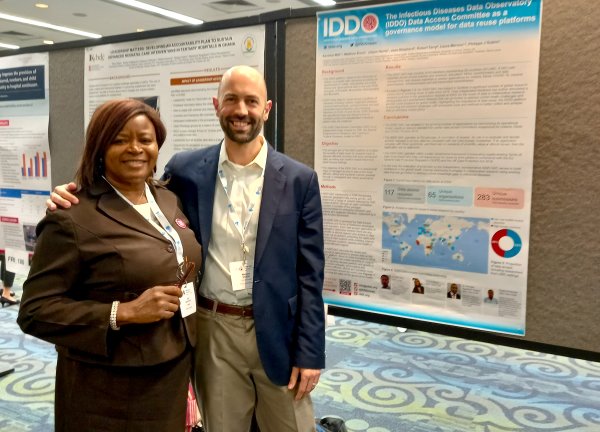IDDO at CUGH: connecting with the global health community
Matt Brack, IDDO’s Senior Programme Manager, recently presented on our equitable approach to data collaborations in global health research at the Consortium of Universities for Global Health Conference (CUGH) in Washington, DC.

It was a busy few days as around 1,500 participants represented 65 countries at the event, which was highly multi-disciplinary, addressing topics ranging from implementation research and policy influence to funding strategy and operational capacity in resource-limited settings, all aligned with CUGH’s aim to support the university as a transforming force in global health.
Matt was joined by IDDO Data Access Committee (DAC) member, Dr Joan H. Shepherd, from the Sierra Leone Ethics and Scientific Review Committee (Ministry of Health and Sanitation) and Principal of the National School of Midwifery who was at the conference to present her work in a session on equity and innovation in health professional education: Covid-19 Pandemic and Post-Pandemic. Dr Shepherd also co-presented a poster on the IDDO DAC as a governance model for data reuse platforms.
“Participating at the recent CUGH Conference offered a unique opportunity to engage in face-to-face interaction with other professionals in the global health drive,” said Dr Shepherd. “Discussions around the presentations by speakers were lively and engaging, paving the way for future areas of collaboration and interest.
“IDDO’s contributions to the conference strategically highlighted ongoing work in selected infectious diseases as it positions sound structures, reliable processes and project outputs of its various research areas contributing to the overall story.”
Several IDDO partner institutions had a prominent role in the conference, including ICDDR,B (International Centre for Diarrhoeal Disease Research, Bangladesh), Nigeria Centre for Disease Control and TDR, the Special Programme for Research and Training in Tropical Diseases, hosted at WHO, who oversee IDDO’s data governance.
Dr Shepherd continued: “Certainly, global health discussions cannot be without mention of infectious diseases, especially since the Ebola outbreak in Guinea, Sierra Leone and Liberia. The work of IDDO makes room for reflection on the critical role of research and use of data to inform policy and practice in low-resourced countries.
“Participants showed a keen interest in the work of IDDO. The poster presentation and speaker’s platform provided an opportunity to share IDDO’s success stories and influence on clinical research. Matt’s presence provided finer details on the relevance of the data repository and enhanced the knowledge base of participants, drawing attention to the important work of data reuse through the data repository.
“The wealth of unused data is the “missing piece of the puzzle” in global health, and its potential value and scientific contribution is well accounted for throughout IDDO’s narrative on utilising data to inform policy and global health action justifiably through its data repository and equitable access.
“Personally, the conference stimulated a deeper sense of responsibility to contribute to collaborative research as a priority area now and in the future. Encounters at the CUGH conference further energised and inspired one to do more through global networks and collaborative partnerships. It enhances the thirst for continuous professional development and education, particularly during pandemics, and getting to know what others are doing in contributing towards achieving the vision of global health.”
About CUGH
Initially formed in 2009 by a handful of U.S. universities, the 14th Annual Consortium of Universities for Global Health Conference has expanded to include a growing membership of institutions in the Global South, and IDDO presented its work in the context of a session on Decolonization: Reforming Global Health, Equity, Justice, Education and Research.
CUGH represents a powerful global network to help deliver shared solutions to problems for universities in the global health space that would otherwise be tackled in isolation, with representative committees and expert working groups covering advocacy, education, operations, research, ethics and legal matters. IDDO will be maintaining links established at the conference in order both to learn, and to share its experience in equitable approach to data collaborations in global health research.

